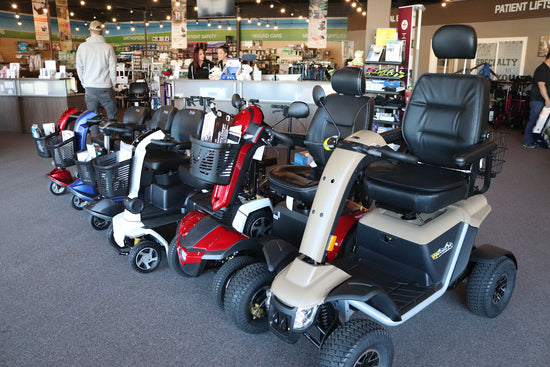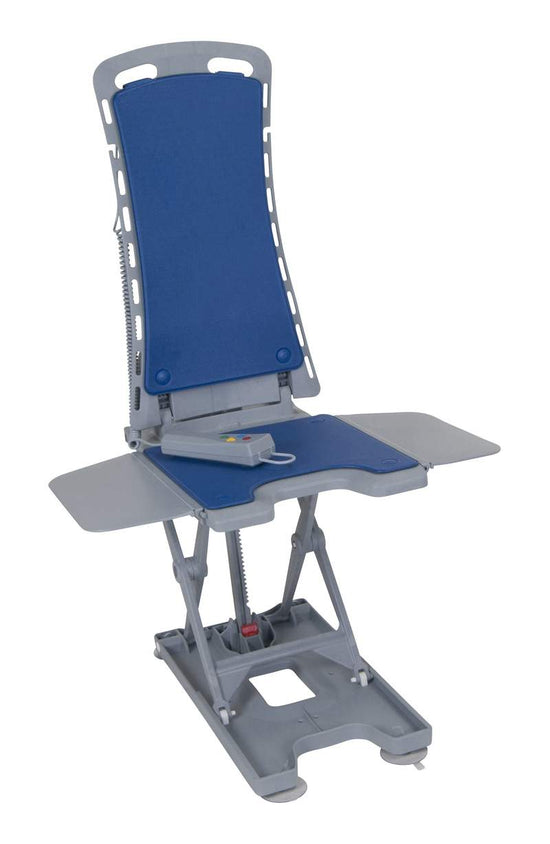Selecting the right lightweight transport wheelchair can significantly enhance your travel experience by providing the perfect balance of comfort, convenience, and mobility. Whether you're planning a weekend getaway or embarking on an international adventure, the right wheelchair can make all the difference in ensuring you remain independent and comfortable on your journey.
This guide will help you understand the essential features to consider, from weight and portability to durability and customization options, enabling you to make an informed decision that suits your travel needs and lifestyle.
Understanding Weight Considerations for Travel-Friendly Wheelchairs
When selecting a travel-friendly wheelchair, weight plays a critical role in determining its portability and ease of use. For frequent travelers, a lightweight wheelchair can significantly enhance the overall travel experience by providing greater freedom and reducing the strain on caregivers or travel companions. Typically, transport wheelchairs designed for travel weigh between 15 to 35 pounds, offering a balance between manageability and functionality.
The lighter the wheelchair, the easier it is to lift, fold, and store, whether you're navigating airports, boarding a train, or packing into a vehicle. However, it's essential to ensure that reducing weight does not compromise the chair's durability or comfort. High-quality materials like aluminum or carbon fiber can offer strength without adding unnecessary weight, making them excellent choices for frequent travelers.
When considering weight, it's important to also evaluate the chair’s weight capacity to ensure it meets your needs. The goal is to find a wheelchair that is light enough for easy handling yet robust enough to support the user comfortably. Many lightweight models are designed to cater to specific weight limits, so checking these specifications is crucial.
Moreover, think about additional features that may affect portability and weight, such as detachable footrests or armrests, which can help reduce weight and improve storage options. Ultimately, the right choice should reflect a harmonious blend of weight, durability, and comfort, ensuring that travel is not only feasible but enjoyable. Understanding these weight considerations allows wheelchair users to make informed decisions, facilitating smoother and more enjoyable travel experiences.
Related: MaxiComfort Lift Chair: Your Complete Buying Guide
Evaluating Portability: Folding vs. Non-Folding Wheelchairs
When considering a wheelchair for travel, evaluating portability is crucial. One of the primary decisions to make is between folding and non-folding wheelchairs. Each type offers distinct advantages and potential drawbacks in terms of portability.
Folding Wheelchairs:
- Ease of Storage: Folding wheelchairs are designed to compact quickly, making them ideal for storing in small spaces like car trunks or airplane overhead compartments.
- Transportation Convenience: Their collapsible nature allows for easy lifting and maneuvering, perfect for individuals or caregivers who frequently change modes of transportation.
- Setup Simplicity: Typically, folding models are straightforward to set up, reducing the time and effort required to become travel-ready.
Pros: Highly portable and convenient for frequent travelers.
Cons: May have slightly less structural rigidity compared to non-folding options.
Non-Folding Wheelchairs:
- Durability: Non-folding wheelchairs often provide enhanced stability and durability due to fewer moving parts.
- Consistent Performance: With a fixed frame, these wheelchairs offer consistent performance with less risk of wear and tear from folding mechanisms.
Pros: Superior durability and support, making them suitable for users who prioritize long-term sturdiness over portability.
Cons: Less convenient for travel due to their bulkier size.
Choosing between folding and non-folding options largely depends on your travel frequency and storage capabilities, ensuring that your wheelchair meets your specific travel needs.
Related: How to Transition from a Walker to a Cane Safely
Customization Options: Tailoring Your Wheelchair to Your Needs
Customization is a pivotal factor when selecting a lightweight transport wheelchair for travel, as it ensures the wheelchair meets your specific comfort and usability needs. Here are some key customization options to consider:
- Seat Adjustments:
- Opt for adjustable seat heights and depths to improve comfort and support.
- Consider cushion options for added comfort, especially during extended periods of use.
- Armrest Types:
- Choose between fixed, detachable, or adjustable armrests based on your need for ease of transfer and comfort.
- Some models offer padded or ergonomic armrests for additional support.
- Wheel Configurations:
- Evaluate different wheel sizes and types (e.g., pneumatic vs. solid) to suit various terrains.
- Quick-release wheels can enhance portability and ease of transport.
- Footrest Options:
- Look for adjustable or swing-away footrests to increase comfort and facilitate transfers.
- Some footrests can be elevated to help with circulation during long journeys.
- Backrest Adjustability:
- Consider reclining or tilting backrests for added comfort during travel or rest.
By tailoring these features to your personal preferences and travel requirements, you can enhance both comfort and functionality. The right customizations not only support your daily mobility needs but also ensure a more enjoyable and stress-free travel experience. Remember, investing time in selecting the right customizations will pay off in accessibility and convenience during your travels.
Related: Rolling Walkers: Boosting Your Independence One Step at a Time
The Role of Comfort: Choosing the Right Seat and Back Support
Comfort is a critical consideration when selecting a lightweight transport wheelchair, especially for travel. The seat and back support play a significant role in determining the overall comfort and usability of the wheelchair. A well-designed seat can help prevent discomfort and pressure sores during long periods of sitting, which is particularly important for those who spend extended time in their wheelchair while traveling.
Selecting the right seat involves considering the material, cushioning, and adjustability. Memory foam or gel cushions offer excellent support and can conform to the body, reducing pressure points. Additionally, adjustable seat height and depth can help tailor the fit to the user’s body size and shape, enhancing comfort and support.
Back support is equally important, as it provides stability and helps maintain proper posture. A contoured backrest can offer better alignment for the spine, while adjustable back angles allow for personalized comfort, accommodating both upright and reclining positions. For travelers, the ability to recline can be a valuable feature, offering relief during long journeys.
When choosing seat and back support, consider your specific mobility needs and travel habits. The right combination will not only enhance comfort but also improve the overall travel experience, allowing for greater enjoyment and less fatigue during your adventures. Prioritizing these features ensures that your wheelchair supports your lifestyle, making every trip more comfortable and accessible.
Related: Canes & Crutches: The Underrated Benefits of Using Mobility Aids
Maneuverability: Features That Enhance Easy Navigation
Maneuverability is a key factor to consider when selecting a lightweight transport wheelchair for travel. It directly impacts how easily you can navigate various environments, from bustling airports to narrow hotel corridors. One of the primary features that enhance maneuverability is the wheel size. Larger wheels typically offer better performance on uneven surfaces, making them suitable for outdoor use, while smaller wheels can facilitate easier indoor navigation and tighter turns.
The turning radius of the wheelchair is another crucial consideration. A smaller turning radius allows for greater agility in confined spaces, which is particularly beneficial in crowded areas or when navigating through narrow doorways. This feature can greatly enhance the travel experience by reducing the effort needed to maneuver the wheelchair in tight spots.
Handle design and placement also play a significant role in maneuverability. Ergonomically designed handles can provide a more comfortable grip for the user or caregiver, allowing smoother and more controlled navigation. Some models offer height-adjustable handles, which can be customized to suit the user’s or caregiver’s preference, further enhancing control and ease of use.
When choosing a wheelchair, consider your specific travel needs and the types of environments you frequently encounter. By prioritizing features that enhance maneuverability, you can ensure a smoother, more enjoyable travel experience, enabling you to navigate new destinations with confidence and ease.
Tips for Maintaining Your Wheelchair During Travel
Keeping your wheelchair in top condition during travel is essential for ensuring a smooth and hassle-free experience. Regular maintenance not only prolongs the life of your wheelchair but also enhances safety and comfort as you explore new destinations. One of the first steps to maintaining your wheelchair while traveling is conducting a pre-trip inspection. Check for loose screws, tire pressure, and the condition of the brakes, ensuring everything is functioning properly before you set off.
During your travels, weather conditions and terrain can impact the performance of your wheelchair. Be prepared by carrying a basic repair kit with essential tools and spare parts like inner tubes and wrenches, allowing you to address minor repairs on the go. It's also wise to frequently clean your wheelchair, especially if you've traveled through dusty or wet environments, to prevent dirt buildup that can affect the moving parts.
For travelers based in or visiting Redding, California, or those needing assistance while on the road, Everything Medical offers a reliable point of contact for sourcing quality Home Medical Equipment and Supplies. They provide expert advice and essential products to help you maintain your wheelchair effectively. As a call to action, whether you need a quick repair or a comprehensive checkup, contact Everything Medical to ensure your wheelchair remains in optimal condition throughout your journey. Remember, proactive maintenance is key to a stress-free and enjoyable travel experience.



